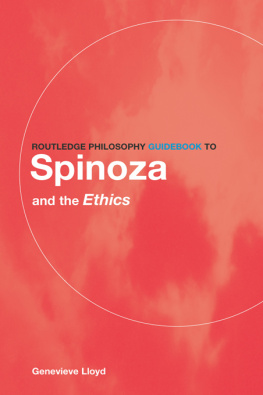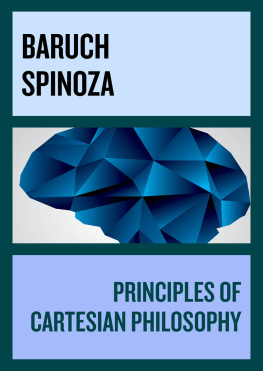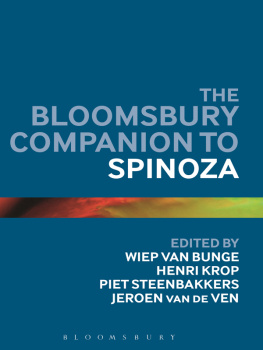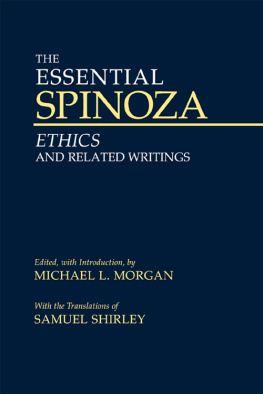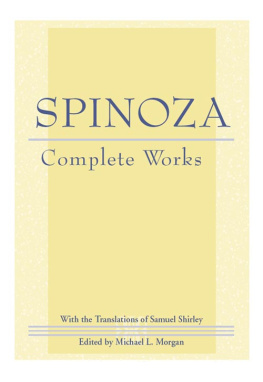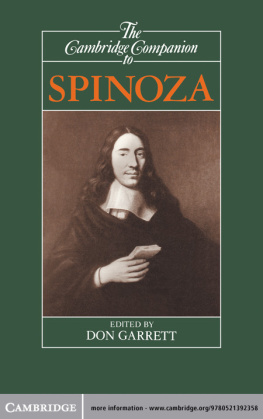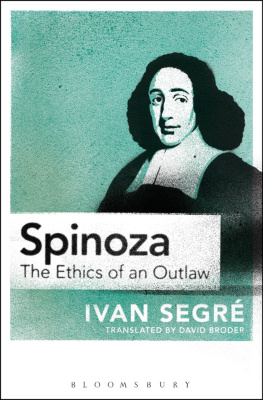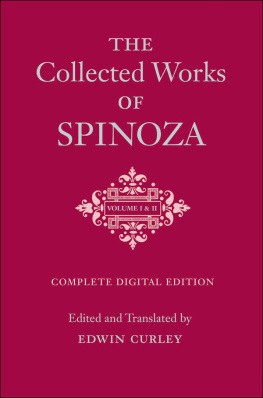Spinoza Benedictus de - Routledge philosophy guidebook to Spinoza and the ethics
Here you can read online Spinoza Benedictus de - Routledge philosophy guidebook to Spinoza and the ethics full text of the book (entire story) in english for free. Download pdf and epub, get meaning, cover and reviews about this ebook. City: London, New York, year: 1996, publisher: Routledge, genre: Religion. Description of the work, (preface) as well as reviews are available. Best literature library LitArk.com created for fans of good reading and offers a wide selection of genres:
Romance novel
Science fiction
Adventure
Detective
Science
History
Home and family
Prose
Art
Politics
Computer
Non-fiction
Religion
Business
Children
Humor
Choose a favorite category and find really read worthwhile books. Enjoy immersion in the world of imagination, feel the emotions of the characters or learn something new for yourself, make an fascinating discovery.
- Book:Routledge philosophy guidebook to Spinoza and the ethics
- Author:
- Publisher:Routledge
- Genre:
- Year:1996
- City:London, New York
- Rating:5 / 5
- Favourites:Add to favourites
- Your mark:
- 100
- 1
- 2
- 3
- 4
- 5
Routledge philosophy guidebook to Spinoza and the ethics: summary, description and annotation
We offer to read an annotation, description, summary or preface (depends on what the author of the book "Routledge philosophy guidebook to Spinoza and the ethics" wrote himself). If you haven't found the necessary information about the book — write in the comments, we will try to find it.
Routledge philosophy guidebook to Spinoza and the ethics — read online for free the complete book (whole text) full work
Below is the text of the book, divided by pages. System saving the place of the last page read, allows you to conveniently read the book "Routledge philosophy guidebook to Spinoza and the ethics" online for free, without having to search again every time where you left off. Put a bookmark, and you can go to the page where you finished reading at any time.
Font size:
Interval:
Bookmark:

Routledge Philosophy GuideBook to
Spinoza
and the Ethics
I have read Spinoza and the Ethics with great pleasure and am deeply impressed. It discusses an exceptionally wide range of past and present readings of the Ethics, so that the reader gains a sense of the many angles from which this text has been approached It offers an interpretation of the whole of the Ethics, and culminates in a fascinating and nuanced discussion of its final section about the intellectual love of God. Most importantly, it develops a distinctive and insightful account which aims both to do justice to Spinozas own philosophical aspirations, and to relate these to our own.
Susan James, Girton College, Cambridge
Written for students coming to Spinoza for the first time, Spinoza and the Ethics is the ideal guide to this rich and illuminating work. This book provides an overview of the critical interpretations, relating the Ethics to its intellectual context; considers its historical reception; and highlights why the work continues to be relevant today. In addition, the most intriguing final sections of the Ethics, usually ignored in introductory commentaries, are given special attention and illuminated as the climax of the work.
Spinoza and the Ethics is the most up-to-date and accessible introduction for students to Spinozas most important text.
Genevieve Lloyd is Professor of Philosophy at the University of New South Wales, Australia. She is the author of The Man of Reason: Male and Female in Western Philosophy and Being and Time: Selves and Narrators in Philosophy and Literature (both published by Routledge), and Part of Nature: Self-knowledge in Spinozas Ethics (1994).

Edited by Tim Crane and Jonathan Wolff
University College London
Locke on Government
D.A.Lloyd Thomas
Plato and theRepublic
Nickolas Pappas
Locke on Human Understanding
E.J.Lowe
Heidegger andBeing and Time
Stephen Mulhall
Wittgenstein and the Philosophical Investigations
Marie McGinn

Routledge Philosophy GuideBook to
Spinoza
and the Ethics
 Genevieve Lloyd
Genevieve Lloyd
| First published 1996 by Routledge 11 New Fetter Lane London EC4P 4EE | British Library Cataloguing in Publication Data A catalogue record for this book is available from the British Library. |
| This edition published in the Taylor & Francis e-Library, 2002. | Library of Congress Cataloging in Publication Data Lloyd, Genevieve Routledge philosophy guidebook to Spinoza and the Ethics/ Genevieve Lloyd. p. cm.(Routledge Philosophy GuideBooks) 1. Spinoza, Benedictus de, 16321677. Ethica. 2. EthicsEarly works to 1800. I. Title II. Series B3974.L57 1996 170dc20 966392 |
| Simultaneously published in the USA and Canada by Routledge 29 West 35th Street, New York, NY 10001 | |
| 1996 Genevieve Lloyd | |
| Text design: Barker/Hilsdon | |
| All rights reserved. No part of this book may be reprinted or reproduced or utilized in any form or by any electronic, mechanical, or other means, now known or hereafter invented, including photocopying and recording, or in any information storage or retrieval system, without permission in writing from the publishers. | ISBN 0-203-42700-9 Master e-book ISBN |
| ISBN 0-203-73524-2 (Adobe eReader Format) ISBN 0-415-10781-4 (hbk) ISBN 0-415-10782-2 (pbk) |
For Jerome
Contents
Acknowledgments
This book was completed with the assistance of an Australian Research Council Small Grant.
I am grateful also to Sandra Lynch for research assistance; to Moira Gatens and Amlie Oksenberg Rorty for helpful discussion of points of interpretation; to Susan James and Thomas Cook for constructive critical comments on the manuscript; to the School of Philosophy and the Faculty of Arts and Social Sciences at the University of New South Wales for practical assistance; to the Department of General Philosophy at the University of Sydney for a visiting professorship during the first semester of 1994; and to students of the University of New South Wales and the University of Sydney for their lively engagement with Spinozas Ethics, and their intelligent critical response to sections of this book which I tried out in their courses.
Abbreviations
Abbreviated references to the Ethics follow the conventions introduced by Curley in the introduction to A Spinoza Reader (Curley 1994: xxxv). Thus:
E=Ethics
A= Axiom
P=Proposition
D (following a Roman numeral)= Definition
D (following P+an arabic numeral)= the Demonstration of the proposition
C= Corollary
S=Scholium
Exp= Explanation
L=Lemma
Post= Postulate
Pref= Preface
App= Appendix
DefAff= the definition of the affects at the end of Part III
Roman numerals before these abbreviations refer to parts of the Ethics.
Chapter 1
Spinoza in his time and ours
The outsider
Cursed be he by day and cursed be he by night; cursed be he when he lies down, and cursed be he when he rises up; cursed be he when he goes out, and cursed be he when he comes in. The Lord will not pardon him; the anger and wrath of the Lord will rage against this man, and bring upon him all the curses which are written in the Book of the Law, and the Lord will destroy his name from under the Heavens
(Wolf 1927:146)
Thus did the wardens of the Amsterdam synagogue excommunicate the 24-year-old Baruch Spinoza, on 27 July 1656. The record of excommunication mentions horrible heresies which he practised and taught and monstrous actions which he performed. The content of the heresies can be reconstructed from contemporary reports of his beliefs and from his writings. Spinoza held unorthodox views on the nature of God and of the human soul, on immortality and on the status of prophecy. Spinozas early biographers make it clear that his views were widely despised. The nature of the monstrous deeds mentioned in the record of excommunication is more difficult to determine.
There are two old biographies of Spinoza. One was written by a Lutheran clergyman, Johan CohlerLatinized as Colerusand first published in 1705. The other, by Jean Maximilian Lucasa freethinking French refugee living in Hollandis thought to have been written soon after Spinozas death in 1677, though not published until 1719. Colerus describes Spinozas physical appearance: He was of a middle size, he had good features in his Face, the Skin somewhat black, black curld Hair, long Eye-brows, and of the same Colour, so that one might easily know by his Looks that he was descended from Portuguese Jews (Pollock 1899:394). Spinozas doctrines are presented by Colerus as impious, absurd and pernicious; but he grudgingly acknowledges the integrity and amiability of the character from which they issued.
The older biography makes the allegation of monstrous actions even less plausible. Lucas, who knew Spinoza personally, presents him as a lover of solitude, enjoying nonetheless the company of the real men of learning who sought him out in The Hague, where he eventually settled. Lucas offers a picture of a man given over to a passionate love of learning, but delighting too in the joys of sociabilitya lover of company who was not dependent on the admiration of others. His Spinoza is a man with a well-seasoned wit, whose misfortune resulted not from monstrous deeds but from his being too good and too enlightened. Lucas stresses Spinozas freedom from concern with fame or appearances. When he was dying Spinoza requested that his name should not be put on the
Next pageFont size:
Interval:
Bookmark:
Similar books «Routledge philosophy guidebook to Spinoza and the ethics»
Look at similar books to Routledge philosophy guidebook to Spinoza and the ethics. We have selected literature similar in name and meaning in the hope of providing readers with more options to find new, interesting, not yet read works.
Discussion, reviews of the book Routledge philosophy guidebook to Spinoza and the ethics and just readers' own opinions. Leave your comments, write what you think about the work, its meaning or the main characters. Specify what exactly you liked and what you didn't like, and why you think so.

